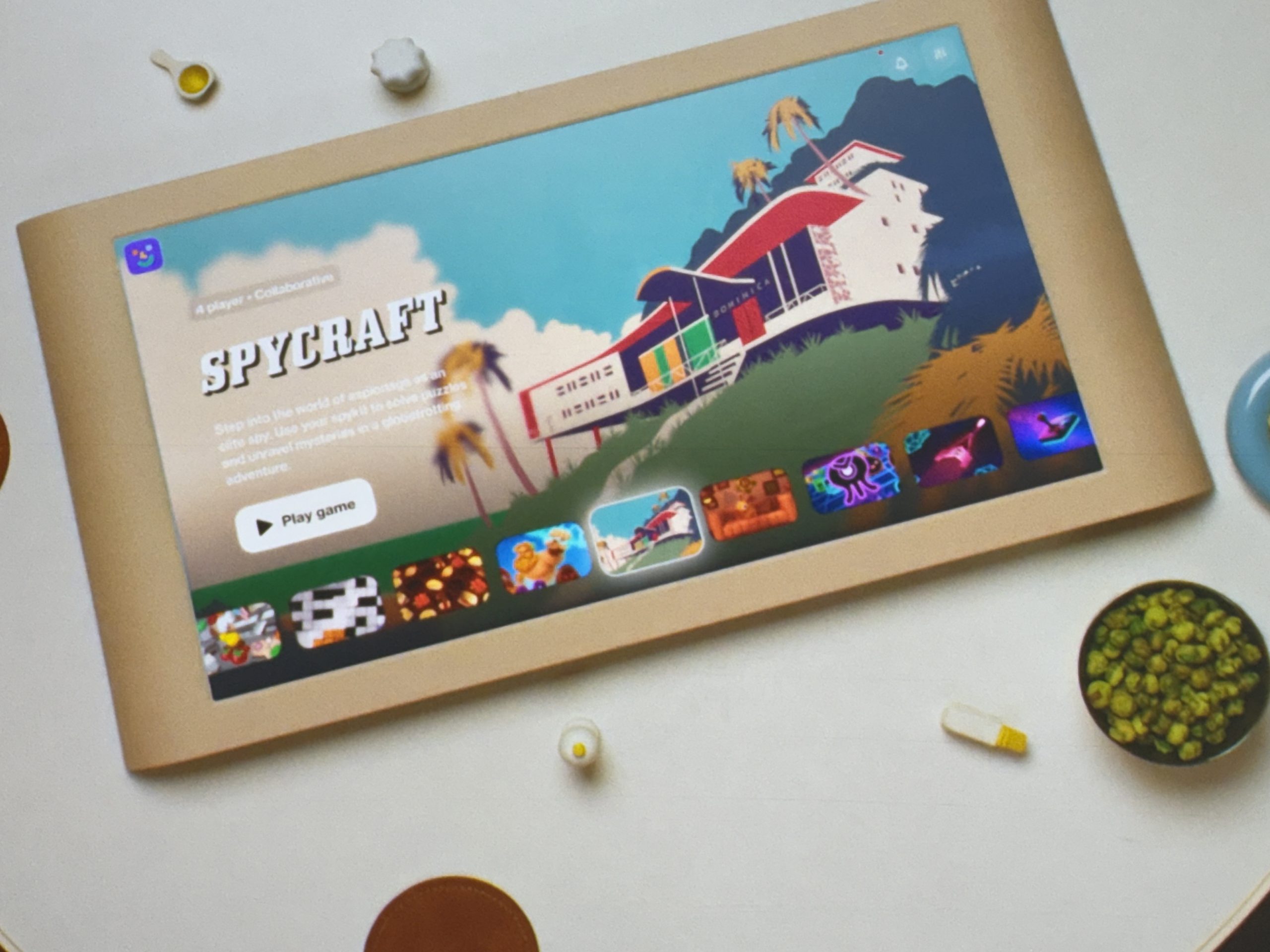
After making a significant impact on the home fitness industry, entrepreneur Brynn Putnam, renowned for founding the connected exercise platform Mirror, is embarking on a new venture that seeks to redefine interactive entertainment. Her latest startup introduces "Board," a novel tech-powered gaming console designed to merge the tactile enjoyment of traditional board games with the dynamic capabilities of video games. This innovative concept was publicly revealed by Putnam herself on Tuesday at the highly anticipated TechCrunch Disrupt 2025 conference in San Francisco, marking her return to the entrepreneurial spotlight since her previous company’s half-billion-dollar acquisition.
Brynn Putnam’s Entrepreneurial Trajectory: From Dance to Digital Fitness
Brynn Putnam’s journey into the tech world is as unconventional as her product ideas. A former professional ballet dancer with the New York City Ballet, Putnam transitioned from the demanding world of performing arts to entrepreneurship with a keen eye for innovation. Her initial foray into fitness technology began with Refine Method, a chain of boutique fitness studios in New York City. It was during this period that she observed a significant barrier to consistent exercise: the inconvenience of scheduling and commuting to classes. This insight sparked the idea for Mirror.
Launched in 2018, Mirror was a groundbreaking product – a sleek, interactive screen that looked like an ordinary full-length mirror when off, but transformed into a personalized fitness studio when activated. Users could stream live and on-demand workout classes, led by instructors displayed directly on the screen, creating an immersive, at-home workout experience. Mirror quickly captured the zeitgeist of convenience and personalized wellness, especially as digital transformation began to sweep through various sectors. Its success culminated in a high-profile acquisition by athletic apparel giant Lululemon in 2020 for a staggering $500 million. The timing of this sale was particularly astute, coinciding with the global pandemic that dramatically accelerated the demand for at-home fitness solutions, solidifying Mirror’s place as a pioneering force in the "connected fitness" movement.
The Genesis of "Board": A New Philosophy of Play
Following the lucrative sale of Mirror, many speculated on Putnam’s next move. True to her innovative spirit, she re-entered the startup arena, driven by a new passion: the universal appeal of play. Putnam articulated her motivation at the Disrupt conference, emphasizing that "play is just universal… With fitness, not everyone loves working out, and not everyone loves working out at home, but play really unites us. It’s sort of this universal language that connects us and brings us together." This philosophical underpinning distinguishes Board from Mirror, aiming for a broader, more inclusive audience by tapping into a fundamental human desire for connection and recreation.
The concept behind Board is to bridge the often-separate worlds of digital and physical interaction. While traditional video games often immerse players individually or connect them virtually, and classic board games foster face-to-face interaction, Board seeks to combine the best elements of both. It aims to create a central gathering point, much like a traditional board game, but with the expansive possibilities and interactive depth that only digital technology can provide. This approach directly addresses a contemporary cultural yearning for authentic social engagement in an increasingly digitized world, offering a novel solution that leverages technology rather than replaces human interaction.
A Deep Dive into Board’s Technology and Design
At the core of Board is its distinctive hardware: a 24-inch interactive screen encased within an elegant wood finish frame. This design choice is deliberate, intended to integrate seamlessly into a home environment as a piece of furniture rather than a purely utilitarian electronic device. The screen itself is no ordinary display; it’s engineered to recognize a range of inputs including touches, gestures, and, crucially, the presence and movement of physical objects. This tactile feedback mechanism is what truly sets Board apart, allowing players to manipulate physical game pieces directly on the digital surface, blending the tangible with the virtual.
The substantial 24-inch display size is optimized for communal play, accommodating four to six participants who can comfortably gather around it, mirroring the setup of a conventional board game. At its launch, Board is priced at $500 and comes equipped with a foundational library of 12 games and 50 physical game pieces. These initial offerings are designed to showcase the device’s capabilities, ranging from strategy and puzzle games to more lighthearted party experiences, all leveraging the unique hybrid interaction model. The combination of premium hardware, a curated launch library, and a clear focus on social interaction positions Board as a distinctive entrant in the competitive entertainment market.
The AI-Powered Future of Play and Creativity
Looking beyond its initial release, Board envisions a future where artificial intelligence plays a transformative role in enhancing user experiences. Putnam outlined ambitious plans for AI to personalize the device, adapting to individual user preferences and evolving gameplay. Imagine scenarios where vision and voice inputs could influence dynamic environments within games, or where storylines adapt in real-time based on player choices and interactions. This level of personalization promises to keep gameplay fresh and engaging, fostering a deeper connection between players and the digital world of Board.
Furthermore, AI is slated to introduce robust accessibility features, such as real-time translation and voice-to-text capabilities, significantly broadening Board’s appeal to diverse audiences. Perhaps the most compelling long-term vision articulated by Putnam is the empowerment of users as creators. She stated, "Over time, AI really makes anyone able to create on Board. So Board becomes more than a game console. It becomes a place for creative self-expression." This ambition suggests a platform where users, aided by intuitive AI tools, could design their own games, narratives, or interactive experiences, transforming consumers into active participants in content generation. This paradigm shift could unlock unprecedented levels of user engagement and foster a vibrant creative community around the platform, moving beyond traditional consumption models.
Navigating the Evolving Entertainment Landscape
Board enters a dynamic and multifaceted entertainment market. The global gaming industry, encompassing console, PC, and mobile gaming, continues to grow exponentially, driven by technological advancements and expanding player bases. Simultaneously, there has been a notable resurgence in the popularity of physical board games, with innovative designs and complex mechanics attracting new enthusiasts. Board seeks to occupy a unique niche at the intersection of these trends, appealing to those who appreciate the strategic depth and social interaction of board games, but also crave the immersive, evolving experiences offered by digital platforms.
The market landscape for hybrid digital-physical experiences is still nascent but growing. While products like smart tables have existed, they often target commercial or educational sectors. Board’s focus on home entertainment and social play positions it differently. Its competitors aren’t just traditional game consoles like PlayStation, Xbox, or Nintendo Switch, but also emerging augmented reality (AR) systems or even sophisticated digital board game adaptations. The challenge for Board will be to demonstrate that its hybrid approach offers a genuinely superior and distinct experience that justifies its premium price point, rather than simply being a novel amalgamation of existing concepts. Its success will depend on its ability to carve out a unique identity and cultivate a dedicated community.
Building an Ecosystem: Content and Community
A crucial element for the sustained success of any gaming platform is its content ecosystem. While Board launches with a curated set of games developed by its internal studio in collaboration with external developers, the long-term strategy hinges on fostering a robust third-party developer community. The company plans to introduce an app store model, allowing independent developers to create and distribute their own experiences for Board. This open-platform approach is vital for ensuring a continuous stream of fresh, diverse content that can keep players engaged and attract new users.
The establishment of such an ecosystem is a significant undertaking. It requires compelling developer tools, a clear revenue share model, and active community engagement to incentivize creators. If successful, this strategy could mirror the growth trajectories of major mobile app stores or console platforms, where the sheer volume and variety of third-party content become a primary driver of user adoption and platform stickiness. By empowering a broad range of creators, from indie developers to individual users leveraging AI tools, Board aims to cultivate a vibrant, self-sustaining community that continually expands the platform’s utility and appeal.
Investment and Market Positioning
The venture has already garnered significant investor confidence, having secured $15 million in funding to date. Notable backers include Lerer Hippeau, the same venture capital firm that led Mirror’s initial $3 million seed round, alongside First Round and Box Group. This continued support from early Mirror investors signals a strong belief in Putnam’s vision and her ability to execute on innovative, market-disrupting ideas. The company is currently in the process of raising its Series A round, indicating further plans for expansion and product development.
The $500 price point positions Board as a premium entertainment device, comparable to a high-end gaming console but significantly more affordable than some smart home fitness equipment. This pricing strategy suggests a target demographic that values quality interactive experiences and is willing to invest in new forms of home entertainment that prioritize social connection. The challenge will be to clearly articulate the value proposition, ensuring consumers understand how Board differentiates itself from both traditional digital and physical games, and why its unique hybrid model justifies the investment.
Looking Ahead: Opportunities and Challenges
Board represents a bold step into the future of interactive entertainment, blending the nostalgia of physical play with the limitless possibilities of digital technology. Brynn Putnam’s track record with Mirror demonstrates her capability to identify market gaps and create compelling, technology-driven solutions. The emphasis on universal play, AI-powered personalization, and a user-driven creative ecosystem presents significant opportunities for innovation and market disruption.
However, the path to widespread adoption is not without its challenges. Educating consumers about a new product category, building a critical mass of engaging content, and attracting a diverse developer community will be crucial. Competing for consumer attention and discretionary spending in a crowded entertainment market will require sustained innovation and effective marketing. Ultimately, Board’s success will hinge on its ability to deliver on its promise of fostering deeper connections and richer play experiences, proving that technology can indeed bring people together in meaningful, novel ways.







